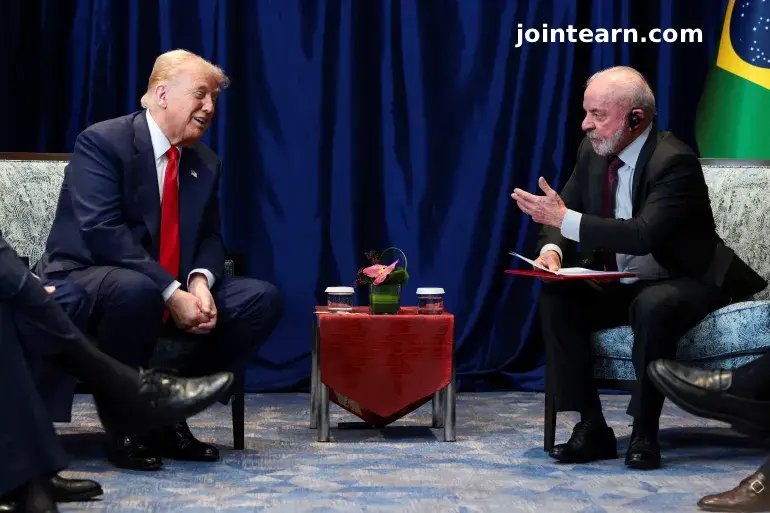
At the 47th ASEAN Summit in Kuala Lumpur, US President Donald Trump and Brazil’s President Luiz Inácio Lula da Silva agreed to begin immediate negotiations to resolve tariffs and sanctions that have strained bilateral ties.
Constructive Talks Amid Tariff Tensions
In a highly anticipated meeting on the sidelines of the Association of Southeast Asian Nations (ASEAN) Summit in Kuala Lumpur, Malaysia, US President Donald Trump and Brazilian President Luiz Inácio Lula da Silva held what both sides described as productive and forward-looking talks.
The encounter marked a rare moment of cooperation between the two leaders, whose political differences — and Trump’s ties to Lula’s imprisoned rival Jair Bolsonaro — have long complicated relations between the two largest economies in the Americas.
President Lula said on social media platform X (formerly Twitter) that both nations’ negotiating teams would begin work immediately to resolve disputes over US-imposed tariffs and sanctions against Brazilian officials.
“We agreed that our teams will meet immediately to advance the search for solutions to the tariffs and sanctions against Brazilian authorities,” Lula stated, describing the conversation with Trump as “great.”
Background: Tariffs and Political Fallout
In July 2025, the Trump administration sharply increased tariffs on most Brazilian imports, raising duties from 10 percent to 50 percent. The White House at the time linked the move to what Trump called a “witch hunt” against former Brazilian President Jair Bolsonaro, who was sentenced to 27 years in prison for attempting to overturn the 2022 election results.
The case drew global attention for its parallels to the January 6, 2021 riots in the United States, when Trump supporters stormed the US Capitol. Bolsonaro’s supporters staged similar unrest in Brasília, attacking government buildings following his defeat.
The US has also placed sanctions on multiple Brazilian officials, including Supreme Court Justice Alexandre de Moraes, who oversaw Bolsonaro’s conviction.
Trump: ‘Pretty Good Deals’ Ahead
Speaking to reporters before the meeting, Trump struck an optimistic tone, signaling openness to rebuilding ties despite past friction.
“I think we should be able to make some pretty good deals for both countries,” Trump said, adding that he expected “very strong relations” between Washington and Brasília moving forward.
For his part, Lula called the earlier tariff hike a “mistake,” arguing that the United States has enjoyed a $410 billion trade surplus with Brazil over the past 15 years.
Negotiations to Begin Immediately
Following the meeting, Brazil’s Foreign Minister Mauro Vieira confirmed that bilateral negotiations would begin immediately, with Brasília requesting a temporary suspension of tariffs while talks continue.
“We hope to conclude negotiations that address each of the sectors affected by the current American tariffs in a few weeks,” Vieira said, emphasizing the urgency of reaching a fair resolution.
The discussions are expected to cover a broad range of trade sectors — from agriculture and energy to industrial goods and digital services — as both countries seek to stabilize a relationship vital to hemispheric trade and investment.
Lula’s Regional Role and Venezuela Mediation
Lula also reportedly offered to mediate between the United States and Venezuela, where Washington has deployed its largest warship amid rising tensions with President Nicolás Maduro’s government. The US has accused Caracas of harboring drug cartels, a claim Venezuela has denounced as “fabricated pretexts” for potential military action.
Brazil, sharing borders and energy interests with Venezuela, has positioned itself as a regional intermediary seeking diplomatic solutions rather than confrontation.
Notably, Bolsonaro’s name was not mentioned during the Trump–Lula meeting, according to Brazil’s Foreign Ministry executive secretary Marcio Rosa, signaling a desire to move past politically charged disputes.
Trade Shifts and Global Impact
The ongoing US tariffs have already reshaped global beef and agricultural trade, pushing up food prices in the United States while boosting Brazil’s exports to China, now at record levels. Some Brazilian producers have begun routing goods through Mexico to bypass tariff restrictions — a trend experts say could undermine both countries’ long-term trade stability.
As one of the world’s largest commodity exporters, Brazil’s trade policies with the US and China remain critical to the balance of global food supply chains.
A Step Toward Renewal
The Trump–Lula meeting in Kuala Lumpur represents a potential turning point in US–Brazil relations, opening the door to renewed cooperation on trade, energy, and regional security.
For both leaders, the meeting offered an opportunity to reset — with Trump eager to demonstrate diplomatic engagement in Asia and Lula looking to secure economic relief amid domestic and international challenges.


Leave a Reply